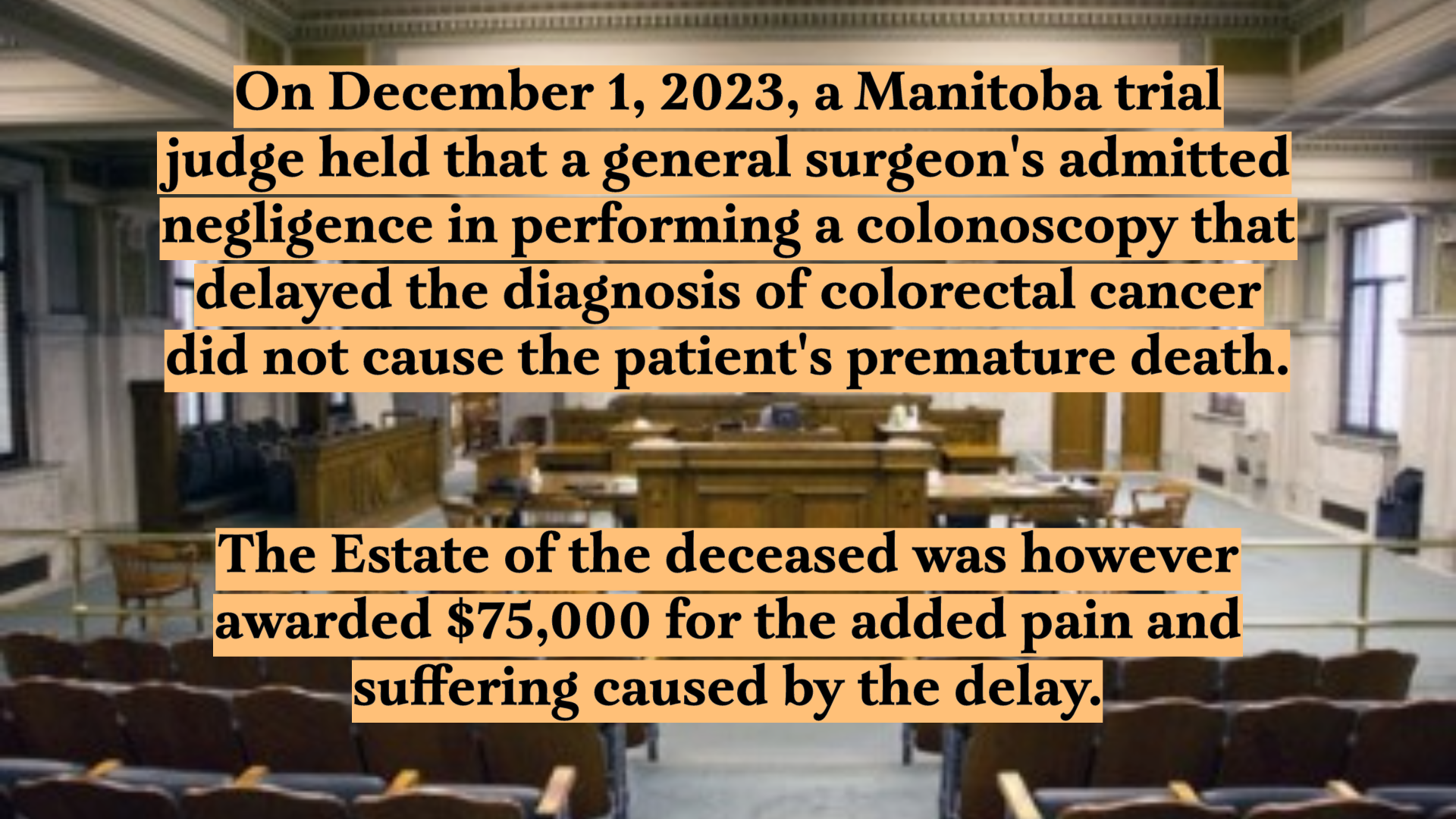On December 1, 2023, a trial judge of the Court of King’s Bench of Manitoba determined that a general surgeon’s admitted negligence in performing a colonoscopy that resulted in a 9 month delay in diagnosing colorectal cancer did not cause the patient’s untimely death.
The judge did find, however, that the late diagnosis of colorectal cancer did cause additional pain and suffering and ordered the doctor to pay $75,000 in damages for the patient’s pain and suffering before he died.
FACTS
On December 18, 2017, Mr. Tripp went to his doctor at the Killarney Clinic complaining about rectal bleeding and abdominal cramps. He was referred to the Defendant, Dr. James Ross, general surgeon, who saw him on December 29, 2017. Dr. Ross suggested a colonoscopy, which was performed on January 12, 2018. Dr. Ross removed five polyps, which were biopsied. The pathologist found that one of the polyps had low-grade dysplasia, creating a significant risk for the development of adenocarcinoma.
Dr. Ross saw Mr. Tripp again on January 24, 2018, and told him the results of the colonoscopy and that some of the polyps that were removed were very aggressive. He told Mr. Tripp to return in one year.
Between March and August 2018, Mr. Tripp had episodic abdominal pain and rectal bleeding. He went to his family physician on August 1, 2018. Blood work showed a low hemoglobin and iron deficiency. As a result, he was referred back to Dr. Ross who saw him on August 10th. A barium enema was ordered, which showed a tumour on the descending colon. A CT scan confirmed the tumour and other abnormalities, including enlarged regional lymph nodes.
Dr. Ross admitted that he was negligent in the manner in which he performed the colonoscopy. Once he found the five polyps, he assumed that he had found the source of Mr. Tripp’s bleeding and did not continue the colonoscopy. Had he continued the colonoscopy, he would have seen the tumour.
Mr. Tripp underwent surgery on October 9, 2018, just over 9 months from when he first saw Dr. Ross.
The surgery included the removal of the tumour, along with 40% of his pancreas, his spleen and all but a foot of his lower bowel. Because the tumour had stuck to the pancreas and the spleen, it could not be completely removed.
In November 2018, Mr. Tripp commenced one of several rounds of chemotherapy treatments. On November 15, 2018, he was admitted to hospital with fever and abdominal pain and spent 11 days there as a result of a perforation in his bowel. Scans performed in December 2018 showed possible liver metastases.
On January 14, 2019, Mr. Tripp’s pancreas stopped working resulting in diabetes, which required insulin injections. The steroids he took before each chemotherapy treatment made the insulin difficult to control.
When Mr. Tripp first saw Dr. Ross, he was a 53-year-old electrician who had been married for 33 years and had three adult sons and two granddaughters. He was physically active in his spare time, golfing, riding motorcycles and ice fishing. He enjoyed renovating homes. He had a workshop in his basement where he liked to do woodwork and crafts. Before being diagnosed with cancer, he always had a project on the go. Mr. Tripp stopped working in December 2019 as a result of his illness. He passed away on February 20, 2022.
Mr. Tripp’s son, Justin, testified that his father had a long, painful recovery from the surgery in October 2018 and the cancer treatments were very harsh. He also said that his father had a lot of issues with diabetes. He testified that his father was very upset that, in spite of doing everything he could to address the symptoms, his diagnosis was missed. He experienced symptoms of depression and was anxious about his poor prognosis.
DECISION
The key issue at trial was whether Mr. Tripp would have likely survived the cancer diagnosis if he had been diagnosed and treater earlier. The determination of this issue turned on whether the cancer had likely already metastasized at the time it should have been diagnosed.
There was a lot of agreement between the oncology experts on each side that were called to provide opinion evidence on causation.
Both doctors testified that colon cancer is slow growing and that the tumour that was found in October 2018 had been there for a long time. The tumour would have been present in January 2018. Both doctors testified that colon cancer may be curable where it has spread locally but that, once the disease metastasizes, it becomes fatal.
In Mr. Tripp’s case, the fact that the cancer had spread to his liver is what made the disease incurable. The Court accepted the evidence that Mr. Tripp’s cancer was likely already metastatic at the time it should have been diagnosed. For this reason, the claims for damages arising from his untimely death were denied.
Mr. Tripp’s son testified about his father’s last years, his long and painful recovery from surgery, the harsh rounds of chemotherapy, his inability to carry on his usual activities, and his depression. While he may have had similar difficulties even if the cancer had been detected in a timely way, the Court was satisfied that the delay in diagnosis exacerbated his suffering. The defence for their part did conceded as much though there was some disagreement on quantum. The trial judge determined that an award of $75,000 for pain and suffering was appropriate in this case.
EXPERTS
Dr. Harvey Schipper was the medical oncologist that testified on behalf of the Plaintiffs.
Dr. Malcolm Moore was the medical oncologist that testified on behalf of the Defendant physician.
Decision Date: December 1, 2023
Jurisdiction: Court of King’s Bench of Manitoba
Citation: Tripp v. Ross, 2023 MBKB 173 (CanLII)
Media: “MD ordered to pay $75K after late cancer diagnosis caused unnecessary pain, suffering before patient died” – Winnipeg Free Press



